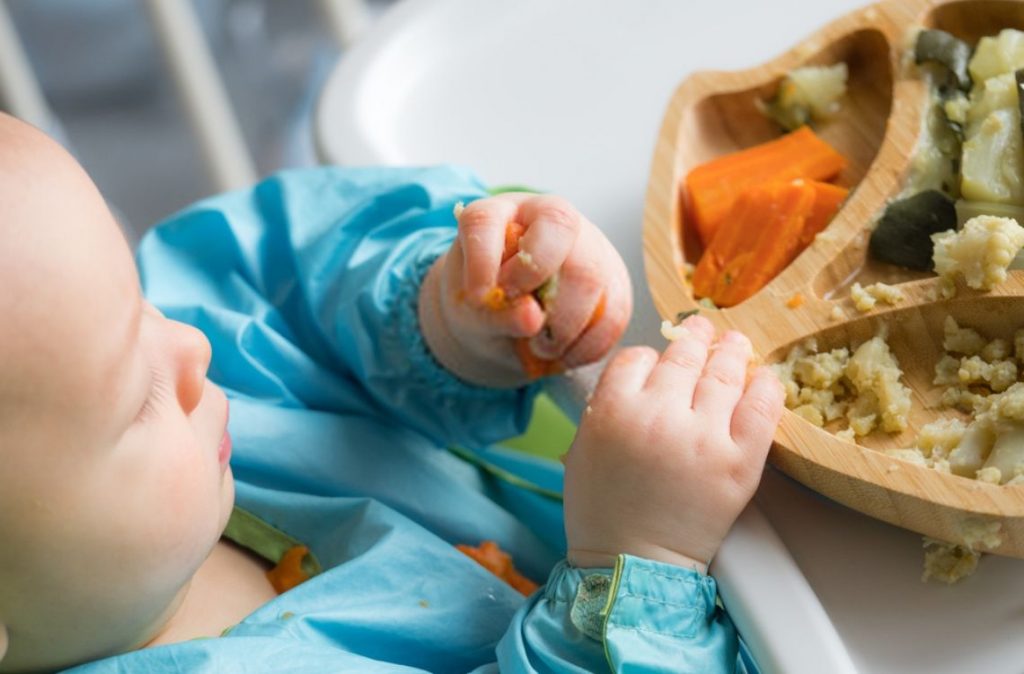As you may be hearing more and more about how organic food is the better choice to feed your baby. You might still be looking for more concrete reasons why you should do so. After all, organic food is more pricey compared to conventional baby food sold at the supermarkets. So, should you or should you not go for it? BabyTalk provides some facts to help you make a choice. But how well does organic food help babies well-being? That for us to find out. Let’s do it now!
How Organic Food Help Babies Well-Being?
Caring For Baby’s Immune And Digestive Systems
First and foremost, as a parent, you might want to take a moment to think about your baby’s tiny and fragile digestive system. When a baby begins to take in solid food, especially at the initial stages the food is mainly made of fruits, vegetables and cereals.
The use of pesticides, herbicides and chemical fertilisers in the growing of all those yummy products to make into processed foods and baby food should be of particular concern. These substances have been proven harmful even to an adult’s health. So naturally, the matter is much higher for babies due to their developing bodies and immature immune and digestive systems.
A baby’s tiny digestive system simply isn’t strong enough to ward off harmful toxins found in pesticides. In other words, while you might be doing the best for your baby by exclusively breastfeeding him for six months or more. You might also end up beating that purpose when comes weaning time. Your baby is unwittingly fed with food that is potentially laced with unhealthy chemical residues.
Why Is Organic Food Different?
Authentically speaking, organic farming methods beats traditional agricultural techniques in terms of superior products in just about every way. Organic farming does not rely on synthetic chemicals, and any other unnatural interventionist approaches for farming and food production. Instead, organic farmers prevent pests by using these primary methods:
- Planting a diverse range of crops.
- Rotating their crops, hence allowing the soil they use to replenish naturally.
- Only natural fertilisers such as manure and compost are used.
- Certain organic standards also apply to animals used to produce milk, eggs and meat. For example, they are not given growth hormones or antibiotics under any circumstances whatsoever. Also, the animals must have access to the outdoors, such as a pasture.
Although the primary concern to parents is feeding their babies with food which is healthy and safe. It doesn’t harm to know that the use of natural biological and environmentally friendly applications also indirectly serves to conserve our natural ecosystems.
Other Options
Many parents mistakenly believe that choosing organic foods limits the number of foods their children will be able to consume. Yes, this may have been the case when organic food was beginning to find its footing in the market. But you may be surprised by many types, flavours and different variety of food are available these days for babies and toddlers. Among the brands worth checking out are;
- BabyBio ( available at Hock Choon Supermarkets)
- Babynat ( Available at Village Grocer)
- Healthy Times ( available at Village Grocer)
- Holle (available at Village Grocer)
- Vitagermine (available at Elite Ecomart)
- Morganics Baby ‘O’ (available at BMS)
- Organic Baby (available at BMS)
When it comes to feeding babies safely, it seems clear that organic baby foods are a positively healthy choice. If you find yourself thinking about your little one’s health and the ingredients found in many common foods, organic baby food should be examined. In addition to jarred baby food, some companies sell organic food that is designed for toddlers.
Be Your Baby’s Organic Chef!
Organic baby food is, in fact, pricier than traditional baby foods. It’s partly due to the extra steps that must be taken to produce them, not to mention the certification it requires. Many grocery stores and organic food stores, both on and offline. Regularly offer sales and discounts, yet the costs may still be too much for many parents to afford on a daily or regular basis.
Make Your Own
If you cannot afford or unwilling to pay hefty sums for branded organic food on a regular basis for your little one. You can still feed your baby organic baby food by making your own. In fact, you’d be surprised just how easy it is to do so. All you need to do is find homemade baby food recipes, and the most important part is to make sure that you use only organic fruits and vegetables.
* Start collecting wholesome recipes for your baby or toddler from BabyTalk every month. Baby Chef Yeoh Leng Swee shares some awesome recipes every month in her column, Baby Gourmet!*
As more and more parents choose organic baby food for their little ones, the entire organic industry will be better supported, which in turn will lead to lower prices, allowing organic foods to be competitively priced. On the whole, any way you see it, it still makes sense to support organically grown foods.
Summing It Up!
Organic baby food is growing in popularity, although it costs more than traditional baby food. When a baby food is labelled “organic”, it means there were no pesticides or herbicides used in the production of the baby food- from the ground to the grocery shelf, the product is free from any chemical additives.
Now that you know more about organic food, you can make the right choice for your little one. For more baby and toddler tips and tricks, make sure to stay tuned to our blog. Don’t forget to check out Motherhood.com.my for all your baby needs to care for your little bundle of joy!
